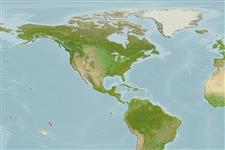>
Perciformes/Serranoidei (Groupers) >
Anthiadidae (Fairy basslets or Streamer basses)
Etymology: Pseudanthias: Greek, pseudes = false + Greek, anthias = a fish, Sparus aurata (Ref. 45335); hiva: Named for Marshall Is. (old Polynesian name is believed to be 'hiva'); noun in apposition..
More on authors: Randall & Pyle.
Environment: milieu / climate zone / depth range / distribution range
นิเวศวิทยา
เกี่ยวกับทะเล,น้ำเค็ม เกี่ยวกับหินโสโครก; ระดับความลึก 10 - 34 m (Ref. 48242). Tropical
Eastern Central Pacific: Marquesas Islands.
ขนาด / น้ำหนัก / Age
Maturity: Lm ? range ? - ? cm
Max length : 10.0 cm SL เพศผู้/กระเทย; (Ref. 48242); 6.0 cm SL (female)
Short description
เครื่องมือที่ใช้ในการแยกชนิดสัตว์,สิ่งมีชีวิตออกจากกัน | สัณฐานวิทยา | ความยาวต่างๆ
เงี่ยงครีบหลัง (รวม) : 10; ก้านครีบอ่อนที่หาง (รวม) : 17; เงี่ยงครีบก้น: 3; ก้านครีบอ่อนที่ก้น: 7; สัตว์มีกระดูกสันหลัง: 26. Body depth 3-3.2 in SL; head length 3=3.2 in SL. No papillae on posterior edge of orbit. Front of upper lip of males without a prominent fleshy protuberance. Tenth dorsal spine longest, 2.05-2.3 in HL. Color of females orange shading to pink ventrally, the scales dorsally on body with dusky yellow centers, those ventrally with yellow; a narrow orange red bar on body below 8th dorsal spine ; a yellow-orange band, bordered below by violet, from lower part of eye to pectoral-fin base; dorsal fin orange with a violet margin; front half of anal fin magenta with a violet margin, the posterior half yellow, the lobe tips bright red. Color of body of males lavender-red dorsally, shading to pale lavender ventrally, the scales below lateral line with yellow centers; head orange-red above a bluish white line from lower edge of orbit to lower base of pectoral fin, pale orange below; dorsal fin translucent orange-yellow with a lavender margin; anal fin translucent lavender with a row of small yellow spots on membranes; caudal fin red, the upper and lower edges and filaments pink; pelvic fins light red. Scales above lateral line to 2nd dorsal spine 6, middle dorsal spines 3.5 (Ref. 48242).
Specimens collected over rocky substrata, usually at depths greater than 25 m; with the use of rotenone and quinaldine (Ref. 48242). Feeds on zooplankton (Ref. 89972). FishBase common name agreed by authors.
Life cycle and mating behavior
Maturities | การสืบพันธุ์ | Spawnings | Egg(s) | Fecundities | ตัวอ่อน
Randall, J.E. and R.L. Pyle, 2001. Four new serranid fishes of the anthiine genus Pseudanthias from the South Pacific. Raffles Bull. Zool. 49(1):19-34. (Ref. 48242)
IUCN Red List Status (Ref. 130435)
Threat to humans
Harmless
Human uses
เครื่องมือ
Special reports
Download XML
แหล่งที่มาจากอินเตอร์เน็ต
Estimates based on models
Preferred temperature (Ref.
123201): 27.7 - 28.4, mean 28 °C (based on 25 cells).
Phylogenetic diversity index (Ref.
82804): PD
50 = 0.5000 [Uniqueness, from 0.5 = low to 2.0 = high].
ระดับชั้นอาหาร (Ref.
69278): 3.4 ±0.4 se; based on size and trophs of closest relatives
ความสามารถในการกลับคืนสู่ปกติ (Ref.
120179): ความสูง, เวลาต่ำสุดที่จะทำให้ประชากรเพิ่มขึ้นเป็น 2 เท่าใช้เวลาน้อยกว่า 15 เดือน (Preliminary K or Fecundity.).
Fishing Vulnerability (Ref.
59153): Low vulnerability (10 of 100).
Nutrients (Ref.
124155): Calcium = 114 [62, 230] mg/100g; Iron = 0.897 [0.488, 1.599] mg/100g; Protein = 17.9 [16.0, 19.6] %; Omega3 = 0.167 [0.098, 0.283] g/100g; Selenium = 23.1 [12.8, 46.6] μg/100g; VitaminA = 240 [80, 798] μg/100g; Zinc = 1.78 [1.17, 2.64] mg/100g (wet weight);
